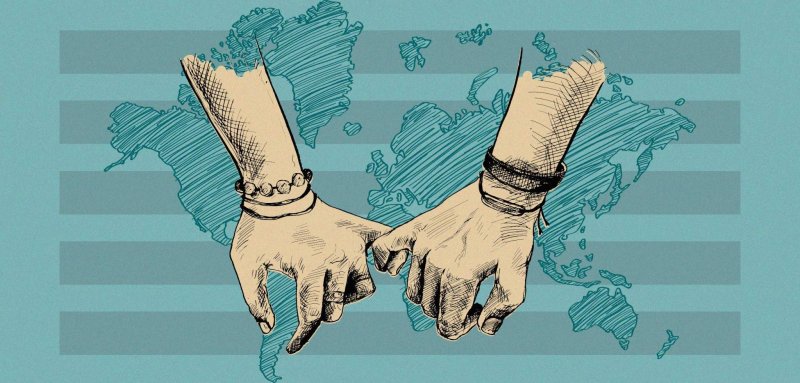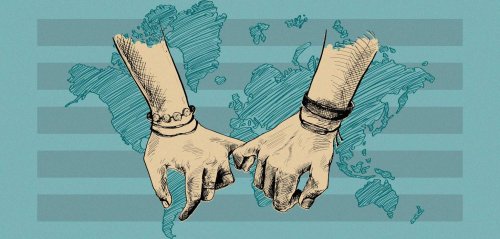A few months ago, I read an English article on the importance of friendship; in the article, the writer argued that the word “friend” in English did not afford the necessary value which conveyed the true meaning of companionship. This idea took me to consider the equivalent usage of the word in our own Arabic language, and the richness comprised in the various synonyms of the word “friend” which could be deployed, according to the type of relationship in question as well as many other factors.
Thus the word “Samir” describes the friend who talks to you during the nights; “Rafiq” the friend who you travel with; “Anees” the friend who keep you company; “Zameel” is a friend from school or work; “Nadeem”, “Jalees”, “Saheb”, “Khalil” and others (to name a few) can all be considered part of the wider umbrella of “friendship”, taking into account the variations in the type of relationships, contexts, etc. Yet an important question is nonetheless posed: do we truly afford the necessary value to friendship in our lives and societies?
The International Day of Friendship, which takes place every year on the 30th of July, provided me a suitable opportunity to think of the importance of friendship in my life; this question was less about its personal value to me as much as it was about how the subject ties into a collective political and social reality, whether that I experienced in Palestine, or which I encountered in my limited travel in Europe and the Arab world, and in Berlin home for the last two years.
When contemplating the question of friendship in my life, I find that one of the main reasons that took me from Acre and Haifa to Berlin was to live in a city that many of my friends from the Arab world would be able to visit, without the need for entry visas, travel permits, barriers and borders; thus, we all live in the same place - if we decided to have dinner together we could accomplish our wish, without asking for permission from anyone.
A romantic idea? Perhaps… but this is precisely what I felt with the passing of time, that friendships are alternative families, which we can choose, build and invest in. On one occasion, as I cried over the end of a relationship with my former partner, a dear friend at the time - and still today - arrived to tell me: “Rasha, friendship is more important than love.” Out of courtesy, I pretended that I agreed with his opinion - but the truth was that inside, I was never convinced until many years after the event… when friendship proved to me its actual ability to create a parallel, more beautiful world with deeper meanings - and that is not a romantic idea.
We were born into a social and cultural norm, one which gives value to the notion of “the one and only love”, which informs the need to find a life partner more than the need to find and preserve a friend. There are many reasons for this - not all of which I will go into now - including religious institutions and economic structures, which were aided by the media and its proxies in entrenching the importance of “finding a partner” more than finding a friend - which ultimately results in the perpetuation of these institutions and the authoritarian structures therein. This is to add to the political reality of dictatorial regimes in the Arab world, which turned the friend into a bogeyman, and laid the foundations for deep problems of trust towards the “other” - the friend - stemming from a fear rooted in self-preservation. Furthermore, these dictatorships infiltrated the spaces of close friendships to achieve their interests, and so on.
Thus, between a colonial entity and dictatorial and reactionary regimes, we lived and still live - me and my friends - as victims of the conception of friendship (and the issue is not personal, but larger than that). I remember my first visit to Tunisia in 2012, after I returned to Palestine, I wrote an extension of this idea: that me and my friends would not forgive the crime of borders, with borders here being politics.
With the Internet, the process of building friendships became a cross-border one. From my small room in Acre, I built and invested in friendships with people in Sidon, Dubai, Damascus, Alexandria, Rabat and elsewhere, without the need to meet face to face. We spent hours talking over Skype, sending to each other photos with intimate details of our daily lives, sharing secrets, stories and scandals. This began around 2006, and four years later the spark of the Arab revolutions lit up. The friends in Tahrir Square, Bourguiba Street and the cafes of Damascus were actually in our houses in Acre, Haifa, Ramallah and Jerusalem more than our neighbours; Their voices, pictures and dreams of a world that accommodates us all - without fear of regimes that live within.
I have written a lot, while still in Acre, about a dream in which I can live in a city that all my friends from anywhere can reach… The city in this dream is #Acre. however, it appears unfortunately that the dream is only a dream, at least for now.
A few days ago, while sitting with a friend from Gaza and another from Ramallah near a small river in Berlin, my Gazan friend posed a question about the importance of friendship in our lives. The answer was the same for all of us: “Friends are family.”
“Friends are family.” This is especially painful for us people, there are those who miss their mothers and cannot reunite with her: the son is unable to return to their homeland, while the mother is unable to acquire a visa to visit her children.
A few days ago, while sitting with a friend from Gaza and another from Ramallah near a small river in Berlin, my Gazan friend posed a question about the importance of friendship in our lives. The answer was the same for all of us: “Friends are family.” This feeling takes on a larger and deeper dimension in the absence of our families from our daily lives. This is both simultaneously beautiful and painful: beautiful because of the fact that humans can create new families all the time through friendships, and painful because there are those who miss their mothers and cannot reunite with her: the son or daughter are unable to return to their homeland, while the mother is unable to acquire a visa to visit her children.
I have written a lot, while still in Acre, about a dream in which I can live in a city that all my friends from anywhere can reach… The city in this dream is Acre, and in this city there are those who come to me carrying an apple and cold drinks in the summer, and a friend who carries with her stories of her relationships and narrates them to us when we are sitting on the same couch, rather than in front of a computer screen. A partner that I can kiss without the need for a visa - however, it appears unfortunately that the dream is only a dream, at least for now.
I accepted this sad reality years ago, even while I was still dreaming that dream. But because I am convinced that we are “ruled by hope”, I naturally could not forgo my dream on the one hand - whilst continuing to try and achieve parts of it as much as possible on the other. So I took myself and came to Berlin, at the time that disasters and catastrophes swept many of our countries, political, social and personal - so that many of my friends can reach Berlin (i.e. exile/the diaspora/the wilderness), including those who could not return home, those who fear doing so, and those who don’t even want to. From the disasters, we were able to create a parallel world - albeit temporary perhaps - resembling that world which we wished to live in… with its founding rock being the friendships that were taught us by “estrangement”, be it optional or forced - it was valued, and was given a new meaning altogether.
Ultimately, does friendship in “exile” have a synonym in Arabic? I don’t know… but perhaps the closest word applicable here is “home.”
Raseef22 is a not for profit entity. Our focus is on quality journalism. Every contribution to the NasRaseef membership goes directly towards journalism production. We stand independent, not accepting corporate sponsorships, sponsored content or political funding.
Support our mission to keep Raseef22 available to all readers by clicking here!
Interested in writing with us? Check our pitch process here!






